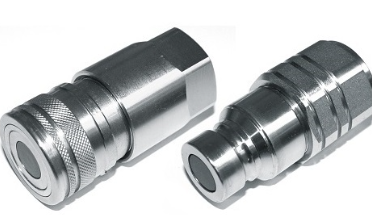Hydraulic systems are the lifeblood of many industries, powering heavy machinery and equipment. However, these systems are highly susceptible to contamination, which can lead to significant performance issues and costly downtime. Even the smallest particles of dirt, dust, or moisture can compromise the efficiency and reliability of hydraulic components.
What Are Hydraulic Flat Face Couplers?
Hydraulic flat face couplers are a type of quick-connect fitting designed to minimize contamination during fluid transfer operations. Unlike traditional couplers with threaded connections, flat face couplers feature a smooth, flat mating surface that reduces the risk of particle entrapment and spillage.
How Contamination Affects Hydraulic Performance
Contamination can cause a range of problems in hydraulic systems, including:
➡️ Reduced component lifespan: Abrasive particles can wear down seals, valves, and other components, leading to premature failure.
➡️ Increased pressure drop: Contaminants can clog filters and restrict fluid flow, resulting in reduced system performance.
➡️ Hydraulic shock: Sudden pressure spikes caused by contamination can damage components and lead to system instability.
➡️ Corrosion: Moisture and other contaminants can accelerate corrosion, leading to leaks and component failure.
Common Sources of Contaminants in Hydraulic Systems
Contamination can enter hydraulic systems from various sources, including:
➡️ Ambient air: Dust, dirt, and moisture in the surrounding environment can be drawn into the system.
➡️ Fluid transfer: During fluid transfer operations, contaminants can be introduced from hoses, pumps, and tanks.
➡️ Component wear: As components wear, metal particles can be released into the fluid.
➡️ Improper maintenance: Poor maintenance practices, such as inadequate cleaning and filtration, can contribute to contamination.
How Hydraulic Flat Face Couplers Keep Systems Clean
Flat face couplers offer several key advantages in maintaining system cleanliness:
➡️ Reduced Fluid Spillage During Disconnection: The flat face design ensures a clean and efficient disconnection process, minimizing fluid loss and reducing the risk of contamination.
➡️ Prevention of Dirt and Debris Entry into Systems: The smooth, sealed connection prevents dirt and debris from entering the system during coupling and uncoupling.
➡️ Easy-to-Clean Surface Design: The flat face design is easy to clean, making it simple to remove any contaminants that may accumulate.
Benefits of Using Hydraulic Flat Face Couplers
In addition to keeping systems clean, flat face couplers offer numerous other benefits:
➡️ Enhanced System Longevity and Efficiency: By reducing contamination and wear, flat face couplers can significantly extend the lifespan of hydraulic systems and improve overall efficiency.
➡️ Lower Maintenance Costs for Hydraulic Equipment: Less frequent maintenance and fewer repairs can lead to significant cost savings.
➡️ Improved Safety for Operators and Equipment: Reduced fluid spillage and easier handling can improve workplace safety.
Applications of Hydraulic Flat Face Couplers
Flat face couplers are widely used in various industries, including:
➡️ Construction: Heavy equipment, such as excavators and cranes, often rely on hydraulic systems.
➡️ Agriculture: Farm machinery, such as tractors and combines, use hydraulic systems for various functions.
➡️ Manufacturing: Industrial machinery and robotics often incorporate hydraulic systems.
Choosing the Right Hydraulic Flat Face Couplers
When selecting flat face couplers, consider the following factors:
➡️ Pressure Rating: Ensure the coupler can handle the maximum pressure in your system.
➡️ Material: Choose a material that is compatible with your fluid and operating conditions.
➡️ Size: Select the appropriate size to fit your hose and fitting connections.
It’s also important to ensure compatibility with your existing system. Consult with a hydraulic specialist to determine the best fit for your specific needs.
Proper Maintenance of Hydraulic Flat Face Couplers
To maintain optimal performance, follow these maintenance guidelines:
➡️ Cleaning Techniques: Regularly clean the coupler surfaces with a soft cloth and a suitable cleaning solvent.
➡️ Routine Inspection: Inspect the coupler for damage, wear, or signs of contamination.
➡️ Replacement Guidelines: Replace damaged or worn couplers promptly to prevent further issues.
Conclusion
By incorporating hydraulic flat face couplers into your systems, you can significantly improve cleanliness, efficiency, and longevity. The benefits of reduced contamination, lower maintenance costs, and enhanced safety make flat face couplers a valuable asset for any hydraulic system.
Post time: Nov-22-2024


